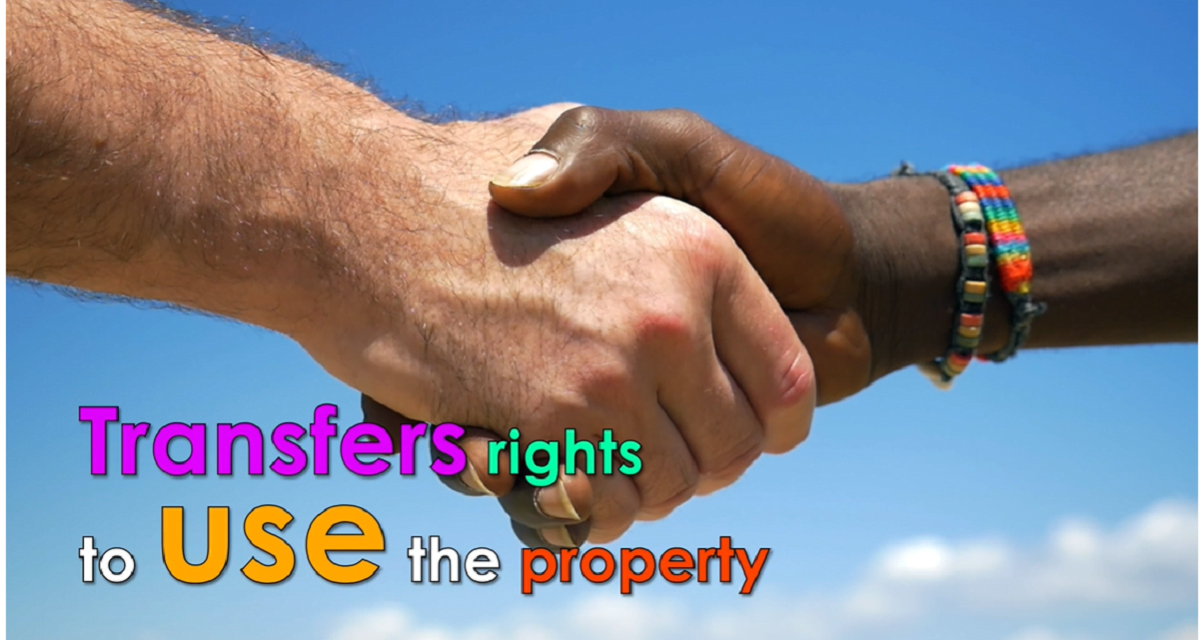A license to use
A license is the personal right held by an individual to the nonexclusive use of property owned by another person. By granting a license, a property owner transfers rights to use the property to another.
A license is similar to an easement and a lease since it transfers a right to use property, yet it is distinct from both. Similar to an easement or a lease, a license is an agreement. However, a license is often oral instead of written. As with an easement, a property burdened with a license is referred to as the servient tenement. Unlike an easement, a license does not have a perpetual life, nor need it have a specific expiration date like a lease.
Also, unlike an easement, a license is a personal right and thus has no dominant tenement which benefits from the license. Accordingly, a license is not appurtenant to any property and may be revocable at any time.
Consider a property owner who contracts for development work to be done on their property. The owner allows the construction company to store excess excavated dirt on one of the owner’s adjacent lots until the construction company can haul it away.
While the dirt remains on the vacant lot, an adventurous dirt biker enters the property and is injured while performing stunts on the excavated dirt. The injured dirt biker claims the construction company is a licensee who is not in possession of the real estate and thus is liable for their injuries.
The construction company claims they have a recreational use immunity since they have an interest in the property as a licensee with a right to use it for the agreed-to purpose.
Case in Point: Use as a personal privilege
A broker wants to increase the exposure of their business to the public by billboard advertising.
The broker has a friend and business acquaintance who owns vacant property adjacent to a highway. The property owner is willing to allow the broker to place a billboard on their vacant land.
The broker and property owner enter into an oral understanding allowing the broker to put up a billboard for the broker’s use only. It is agreed the broker may enter and exit the property at will to install and maintain the billboard.
A time limitation is not specified for maintaining the billboard on the property, nor is any fee or other compensation established. Critically, the property owner does not relinquish any control over the real estate since they do not give the broker any other right to use the property.
Have the broker and property owner established a landlord/tenant relationship or an easement?
Neither! The broker has only been given a license to use the owner’s property.
Unlike a landlord/tenant relationship or an easement, a license to use real estate is a personal privilege, unattached to any property owned by the broker. Thus, the use is non-assignable to others by the broker and, unless agreed to the contrary or is unfair, is revocable by the property owner at any time.
In this example, the holder of any interest in the property is exempt from liability for injuries incurred by others arising out of their recreational use of private property.
The property interest exempt from liability may be either possessory or nonpossessory. Since the holder of a license has a nonpossessory interest in the property, they also have recreational use immunity even though the owner remains in possession and control of the land and the holder of the license has only a nonexclusive personal right to use the property.
Thus, the construction company is not liable for injuries which occur during the dirt biker’s recreational use of the property since the construction company holds an interest in the property under their license to use.
License vs. lease
A license is often confused with a lease. A lease conveys a possessory interest in real estate which allows the tenant to exclude others from occupying the leased premises.
A license to use another person’s real estate is a personal privilege held by an individual. However, a license is neither personal property nor real property.
Further, a license is neither owned by a person nor is it an appurtenance to adjoining real estate. Thus, a license, not being property or capable of ownership, cannot be transferred to the successors or assignees of the license holder.
There are multiple characteristics which distinguish a license from a lease. Unlike a lease, a license may have:
- no writing to formalize the agreement;
- no rental payments;
- no specific location on or within the property where the use will occur;
- no intent to convey a leasehold estate;
- no right to exclude others;
- no termination date; and
- a termination date set at the owner’s will, unless the license is irrevocable.
History of the term
“License” finds its root in the old French term “licence,” from late 14th century meaning, “freedom, liberty, power, possibility; permission,” and the Latin term, “licentia,” meaning freedom, liberty; unrestrained liberty, wantonness, presumption.”
It was first used to reference a formal (usually written) permission from an individual or entity in an authoritative position to another to do something (marry, hunt, drive, etc.). This usage first appeared in the early 15th century.



















